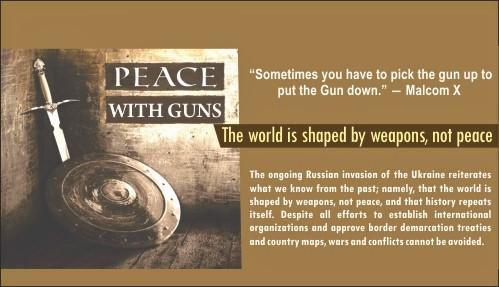In a world marred by conflict and violence, the perception of weapons, particularly firearms, invokes a profound dichotomy among various religious and philosophical schools of thought. The Bahá’í Faith, with its overarching themes of harmony, unity, and justice, presents a particularly intricate perspective on the intersection of spirituality and arms. The juxtaposition of Bahá’í teachings alongside the concept of guns explicitly taps into the broader dialogue on peace and protection. This discourse seeks to elucidate the Bahá’í stance and offer insights into how such views resonate in contemporary society.
The Pursuit of Peace: A Fundamental Bahá’í Tenet
At the heart of the Bahá’í Faith lies the unwavering quest for peace. Baha’u’llah, the founder of this religious movement, espoused the idea that humanity is essentially one family, bound by the fabric of shared existence and mutual dependence. This perspective inherently repudiates war and conflict, proposing instead a governance model rooted in consultation, justice, and equity. Within this paradigm, firearms serve as potent symbols of humanity’s failure to embrace these ideals fully. The Bahá’í community calls for disarmament and advocates for the establishment of a global federation that would nullify the need for militarization and weapons altogether.
Definitions of Protection: Beyond Conventional Understanding
In addressing the subject of protection, it is critical to distinguish between physical security and the spiritual safeguarding of human dignity and rights. For Bahá’ís, true protection manifests not merely through the possession of arms or militaristic capability, but rather in fostering an environment where love, justice, and understanding prevail. This approach reframes the conversation around guns, suggesting that the essence of protection lies in the cultivation of peace-building measures rather than reliance on weaponry.
The Paradox of Fascination
Despite the Bahá’í emphasis on peace, a curious fascination persists with firearms within certain strata of society. This dichotomy raises important questions: What drives individuals towards such armory? Is it merely a reflection of cultural narratives, or does it tap into deeper psychological and existential fears? The allure of guns, often romanticized in media, juxtaposes starkly with the Bahá’í mandate for peace, yet serves as a salient touchpoint for understanding societal complexities.
Cultural Narratives and Their Impacts
Cultural contexts play a significant role in shaping perceptions of firearms. In some societies, guns embody strength, autonomy, and survival. This cultural narrative can overshadow spiritual teachings, creating a chasm between the ideal of peace and the reality of violence. The Bahá’í Faith, recognizing these disparate views, urges its followers to navigate such complexities with a discerning spirit, advocating for dialogue and understanding over entrenched beliefs.
Historical Context: Lessons from the Past
The historical backdrop informs contemporary attitudes toward arms. The 20th century, marked by two World Wars and numerous conflicts, has indelibly shaped the collective psyche concerning weaponry. These events underscore the futility of war, a sentiment echoed poignantly in Bahá’í teachings which witness the devastating consequences of violence. The experiences gleaned from these tumultuous periods propel the Bahá’í resolve for peace, reinforcing the need to disassociate from the trappings of militarization.
Extending Compassion: A Bahá’í Response
In grappling with the duality of peace and protection, Bahá’ís are called to extend compassion to those who feel threatened or compelled to embrace arms for security. This empathy acknowledges the deeply ingrained fears and vulnerabilities that drive individuals towards firearms. A foundational step towards achieving global unity involves understanding these fears and addressing them through dialogue, education, and validation, rather than vilification.
Advocacy for Disarmament
Central to the Bahá’í discourse on firearms is the advocacy for global disarmament. This concept transcends mere political rhetoric; it is a call to action for individuals and governments alike. The Bahá’í community encourages active participation in movements aimed at reducing the proliferation of weapons, drawing on ethical considerations tied to the sanctity of life. By promoting frameworks for dialogue that facilitate disarmament, the Bahá’ís seek to create a paradigm where conflicts can be resolved amicably, thus rendering firearms obsolete.
The Role of Education and Awareness
Education is a powerful tool in reshaping perceptions surrounding firearms. Bahá’í teachings advocate for comprehensive education that not only highlights the consequences of violence but also instills values of peace, respect, and coexistence. By creating spaces for dialogue and fostering critical thinking, the Bahá’í community endeavors to cultivate an informed society that can critically assess the role of guns and transition towards more peaceful solutions.
A Vision for the Future
The Bahá’í vision for the future is one where the profound teachings of unity prevail over division, and where the specter of guns recedes in favor of dialogue and mutual understanding. The commitment to peace, justice, and equity embodies a radical shift in how societies conceptualize and engage with weapons. As global citizens navigate the complexities of a world rife with conflict, the Bahá’í teachings serve as a guiding light, illuminating the path towards a more harmonious existence.
Through the lens of Bahá’í wisdom, the conundrum of guns is not merely a matter of physical armament. It serves as a catalyst for deeper introspection on the nature of security, the essence of protection, and the imperative of fostering global peace. Embracing these principles offers a pathway not only for understanding the present but for catalyzing a future steeped in unity and collective progress.
